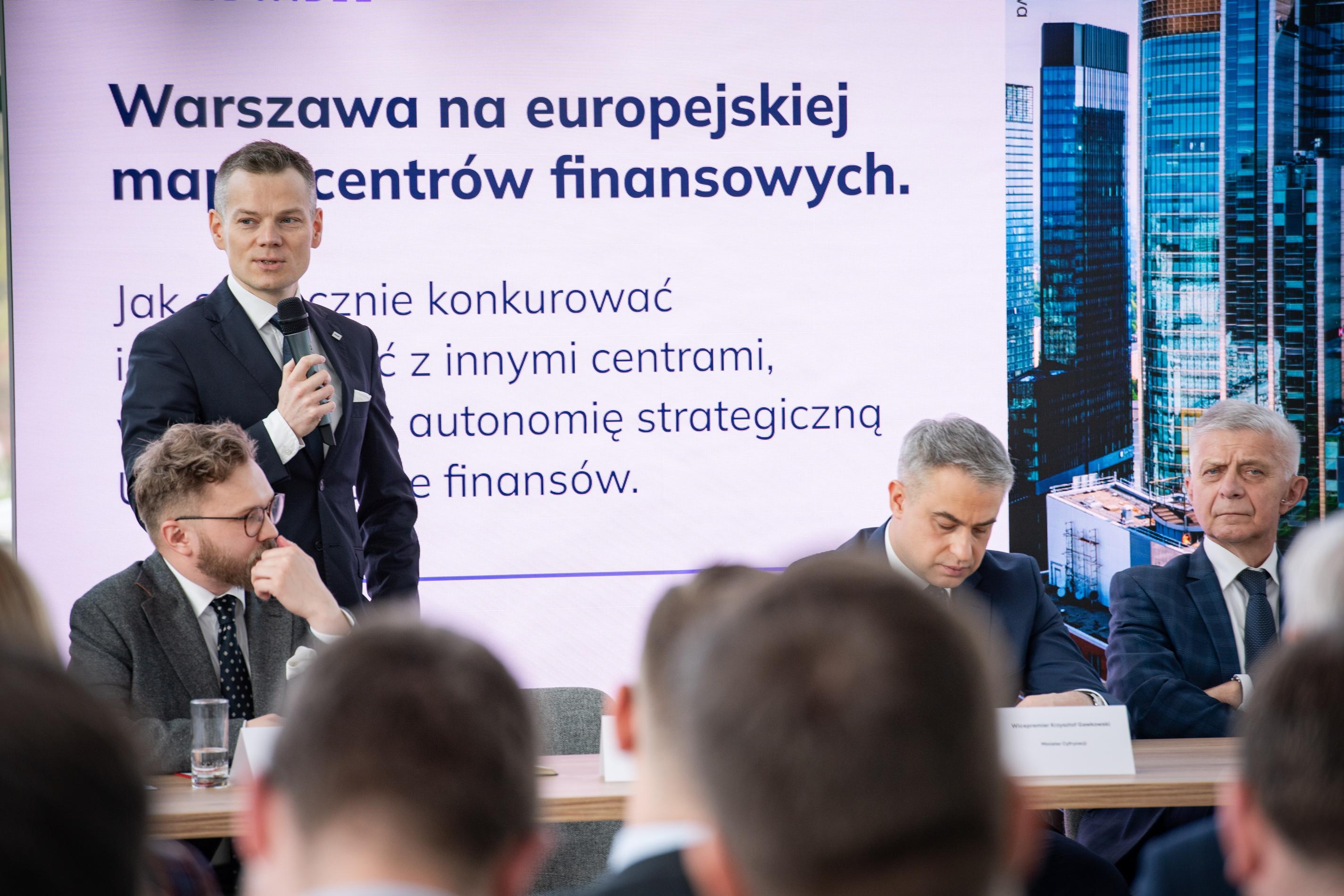Home - Komisja Nadzoru Finansowego
Jacek Jastrzębski took part in a debate on Warsaw as a new financial hub
The hosts of the event were: Prof. Marek Belka, Member of European Parliament, and Paweł Widawski from Future Finance Poland. The Future Finance Poland project aims to create coordination and cooperation mechanisms and develop effective tools to support the development of the Polish financial centre at the regulatory, technological, business and marketing levels. The initiative involves promotion of the Polish financial hub internationally and supporting the expansion of Polish financial firms abroad.
In his address, Jacek Jastrzębski said that from the outset Urząd Komisji Nadzoru Finansowego (UKNF) had supported the project of creating a next-generation financial centre. ‘Our discussion so far has basically led us to clear conclusions: we should look for fields of specialisation that are specific to the Polish market. Today our thinking already goes further, as we’ve identified our future core specialties. Many of them are very close to my heart when it comes to the UKNF’s operational strategy, as many of those topics, already identified as part of Future Finance Poland as the necessary core areas for our future specialisation, are the areas of financial supervision where we’re trying to put more weight on competence, skills and expertise’, Jacek Jastrzębski said.
‘I’m very happy we’re on this path, with new specialties emerging. I’m also very glad we’re heading firmly towards new technologies. Today’s presence, during our discussion, of so many representatives of institutions traditionally associated more with IT or tech industry than finance shows that our direction is well defined. I agree that our future specialties relative to Warsaw as a next-generation financial centre should be developed with the best talent we have. Certainly, it’s the talent in the area of new technologies, information technology. I’m also referring to the payments sector and Poland’s leading role in this area. The example of Blik as a success story in the Polish market shows that creating a national standard is a meaningful purpose because if built right, the national standard has the potential to become an international standard’, Jacek Jastrzębski added.
The Chair of the KNF said that another aspect of specialisation is the new technologies that had forced their way into the mainstream financial market a bit later. ‘I’m referring to issues regarding analytics and artificial intelligence. I believe that data and AI is a subject we should not overlook. Our responsibility as managers of financial institutions or managers in the public sector is to make sure we don’t overlook something that can become a revolution. As even if it turns out after a while that it wasn’t a revolution, we can’t afford to underestimate it. I think AI is an area like that, a potential revolution in the making, perhaps even similar to the launch of a PC or internet. I’m not saying this definitely will happen but it would be a big mistake not to make use of it.’
Jacek Jastrzębski also mentioned competition policy in the financial market in Poland. ‘We’re very attached to the traditional financial market, where most financial services are offered by firms that are well established, mostly banks. What we can see in the European Union is the gradual opening of the EU market to non-bank institutions. A classic example is the new elements of the PSD package. I guess this will be happening more and more. What we can already see in our supervisory practice is the growing competition between traditional service providers, e.g. banks, and new categories of service providers, such as payment institutions or non-bank lending institutions. The EU’s Financial Data Access Framework (FiDA) will also contribute to a greater competition in this area. From our point of view it’s a challenge in terms of finding the best model of competition between traditional financial service providers, being subject to a particular regime, a model that also increases the costs, but it’s also a situation where such providers are seen as firms offering a higher level of security. How will this interact with all the new elements of the market? This matter is pretty high on our agenda for the nearest future. It seems that the importance of traditional players in the financial market will decline. I’d say it’s one of the objectives of the competition policy at EU level. This is why we need to reflect on how we see it and what we expect’.
Jacek Jastrzębski emphasised that Poland has a particular model of relations between banking and fintech, stemming from the high degree of technological advancement of Polish banks. Preparing ourselves to join the EU-level legislative process, we have to answer the question what features of our model of interactions between banking and fintech firms are particularly valuable and desirable for market development, and then seek regulatory solutions that will allow us to keep those features, to the benefit of the Polish market.
The Chair of the KNF also appreciated the competence-related aspect, which determined the creation of the next-generation financial centre. A centre like that cannot be created without advanced financial supervision, exercised with the skills and knowledge which match the leading-edge market standards. This is why Jacek Jastrzębski asked the representatives of the financial and tech industries to treat financial supervision as a kind of common good. He emphasised the UKNF’s readiness to engage in dialogue with representatives of the financial and tech industries, stating that such dialogue was an important component of supervisory competence building. He also encouraged market participants to start and maintain the dialogue, as a way to create a common resource in the form of the quality of supervision and, consequently, the quality of Warsaw as a financial hub.





